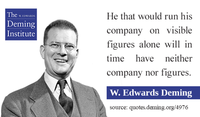Posts selected fromManagement Blog - Engineering Blog - Investing Blog and other blogs - Using Deming’s Ideas When Your Organization Doesn’t
First, you can transform yourself. You can transform your understanding and how you learn (with an appreciation for the theory of knowledge and what conclusions you can and cannot draw from the data you use). You can transform how you act.
View your organization with an understanding of Deming’s management ideas. Think of the organization as a system. Even if you can’t persuade others to do this, you doing so will help you understand the situation more clearly and allow you to think of solutions that take advantage of this understanding. System thinking will allow you to find leverage points that can be used to multiply the benefits of improvements. continue reading: Using Deming’s Ideas When Your Organization Doesn’t - Deadly Disease of Management: Emphasis on Short-term Profits
 - Dilbert and Deming
 Dilbert can show the silliness that is common place in many workplaces, as just that – silly. Point 10 of Deming’s 14 points called on management to eliminate slogans.
...
The text works well for me, but I think Dilbert provides a great service in pointing out the same idea that such slogans are silly and even harmful in a way many others find more accessible. continue reading: Dilbert and Deming - The Quick Fix
W. Edwards Deming
One trouble with American industry today is that top management supposes that one lecture or one day will do it. “Come, spend a day with us, and do for us what you did for Japan, that we too may be saved.”
continue reading: The Quick Fix - Agile Software Development and Deming's Ideas
- Deming and Toyota
I believe Toyota applied Deming’s ideas to create a management system and continued to develop that system to create the Toyota Production System (also known as lean manufacturing). continue reading: Deming and Toyota - Theory of Knowledge
 When managing many fail to predict when attempting to test improvement ideas through what should be experiments (often they are just changes without verification the change produced a desired effect, any learning or study of the results of the change). Without prediction learning is much less (if there is any at all) than it would be with such prediction.
...
With, even a fairly simple understanding of the theory of knowledge the effectiveness of management improvement efforts are greatly increased. This topic is difficult for most to understand, I recommend reading chapter four of the New Economics. continue reading: Theory of Knowledge - Performance without Appraisal
 In the short article Performance Without Appraisal: What to do Instead of Performance Appraisals, Peter wrote:
Dr. Deming said of Performance Appraisals, “Stop doing them and things will get better.” He was correct. Many organizations, however, wonder what to do instead.
For those that do require “some alternative” Peter included some good ideas in The Leader’s Handbook(see chapter 9 “Performance without Appraisal pages 293 to 368). This chapter has excellent material for any manager. continue reading: Performance without Appraisal - Fast Company Interview: Jeff Immelt
My guess would be that what lead to this quote is not a lack of understanding that managers need the same qualities today they needed 10 years ago but the compulsion to feed the media frenzy for some incredible new insight. It just isn’t sexy to say “we need the same leadership qualities we needed in the past.” Deming stressed the importance of these “new” qualities he states more than 50 years ago and I think most decent managers have know you need to “know why we’re doing them”
...
Customer focus and innovation would also be at the top of the list of important issues and were 10 years ago and will be 20 years from now. What is important for management does not change much.
occasionally innovation is so dramatic it drastically changes the practice of management, two examples:
1) the use of information technology
2) the whole quality movement [Deming’s ideas, SPC, Toyota/Lean, Six Sigma… continue reading: Fast Company Interview: Jeff Immelt - Management is Prediction
I believe Deming’s thoughts about prediction are most effectively put into action using the PDSA cycle. Specifically, you must predict the results in the planning phase (prior to piloting improvements). I find that this is rarely done. I don’t think the form of that prediction is critical (narrative with loose numerical guesses, precise numerical prediction…). The critical issue is making the prediction, then comparing the results to that prediction and then figuring out how your original understanding can be improved based on the new data.
Learning will not only be about the specific case being examined, but also, over time, learning about your tendencies in prediction. continue reading: Management is Prediction - Deming’s Ideas at Markey’s Audio Visual
Mark Miller, General Manager, Markey’s Audio Visual spoke on Markey’s experience adopting Deming’s ideas.
- Markey’s needs to anticipate the changing needs of customers and anticipate those needs
- Unknown and unknowable – not really unknown just un-measurable (again taught to all employees)
- Gemba – where the real work gets done (the customer interaction – he stressed time and again that the key to their success was Markey’s employees interaction with customers – Markey’s aims to provide the best customer experience the customer has with any company)
- Break down barriers between departments – Markeys doesn’t charge internally. Indianapolis looses money – they own the high end equipment used by the other offices.
- Intrinsic motivation v. Extrinsic motivation – he has the chart from page 122 of New Economics in Deming’s handwriting on his wall.
continue reading: Deming’s Ideas at Markey’s Audio Visual - W. Edwards Deming’s Seven Deadly Diseases
Seven Deadly Diseases
- Lack of constancy of purpose
- Emphasis on short term profits (Overreaction to short term variation is harmful to long term success. With such focus on relatively unimportant short term results focus on constancy of purpose is next to impossible.)
- Evaluation of performance, merit rating or annual review (see: Performance Without Appraisal: What to do Instead of Performance Appraisals by Peter Scholtes).
- Mobility of top management (too much turnover causes numerous problems)
- Managing by use of visible figures, with little of no consideration of figures that are unknown or unknowable.
continue reading: W. Edwards Deming’s Seven Deadly Diseases - The Purpose of an Organization
W. Edwards Deming described the purpose of an organization in New Economics, on page 51, as:
The aim proposed here for any organization is for everybody to gain – stockholders, employees, suppliers, customers, community, the environment – over the long term. continue reading: The Purpose of an Organization - Deming and Six Sigma
I agree aspects of Six Sigma are bad. I also think some aspects of Six Sigma are good. And I think the same things about TQM.
continue reading: Deming and Six Sigma - Managing the Supplier Relationship, at Ford and Elsewhere
Ford said they were committed to the Deming philosophy in the 1980’s and 1990’s. Donald Petersen, former CEO of Ford Motor Company, was one of those included in the Deming Library Tapes.
Nothing has changed from 1990 to today [October 2005] that explains why Ford saying they are going to deal with suppliers differently now should work any better then such statements 15 years ago. Until they acknowledge what problems in their management system have caused them to fail to use sensible management practices that have been well know for decades I see no reason to believe their claims that they will behave differently this time. continue reading: Managing the Supplier Relationship, at Ford and Elsewhere
|